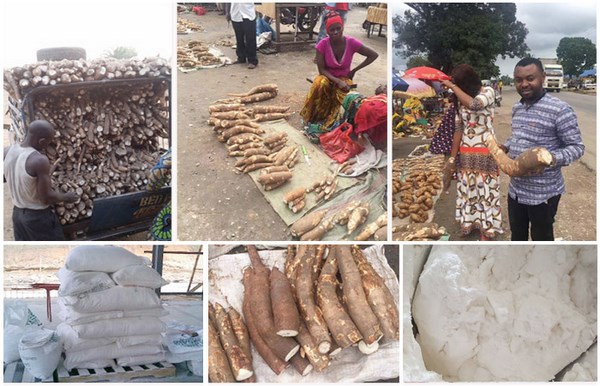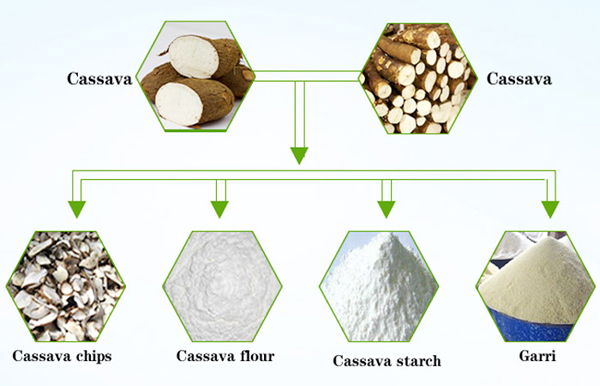Economic importance of cassava in Nigeria
Industry news / Chat on line / Give me a price / Date:2019-09-10
According to local media reports, the United Nations Food and Agriculture Organization (FAO) report shows that in 2014, the value of the cassava industry in Nigeria was 18 billion US dollars, and the export volume of cassava was 1.3 billion US dollars. Nigerian Agriculture Minister said that in 2013, Nigeria signed a 3.2 million tons of cassava export contract. If the European and Chinese markets can be further developed, it is expected to receive $1.3 billion and $803 million in contracts, respectively. It is reported that the demand for high quality cassava flour in the Nigerian local market has reached nearly 100 million US dollars. The economic importance of cassava in Nigeria is self-evident.
 Cassava in Nigeria
Cassava in Nigeria
Since cassava roots are highly perishable, processing is very important for the future of cassava. Cassava root can not only be used as human food, but also used as feed and important industrial raw material. With cassava as raw material, it can produce more than 2000 products. With the increase of the value of cassava processing products, the economic importance of cassava in Nigeria has also emerged. Processed products from Nigerian family and village workshops can be sold as convenience foods, especially for garri (Gari in Western Africa, Foufou in Central Africa, Farinha in Brazil) and cassava flour, which can be used as a partial substitute for wheat flour. And cassava starch also plays an important role in the fields of chemical industry, medicine, textiles, paper, and food. Therefore, economic importance of cassava in Nigeria reflected in its function as one of the indispensable crops for the national economy and the people's livelihood in Nigeria.
The upgrading of industrial technology has triggered the cassava industry revolution in Nigeria. In the past ten years, the use of cassava has become more and more extensive, the cassava industry chain has been continuously extended, and the application range of cassava processed products has continued to expand. Therefore, the demand for cassava and cassava processed products is also rapidly increasing internationally. And the economic importance of cassava in Nigeria is beginning to be taken seriously by the Nigerian government.
The processing products of cassava include cassava starch, cassava flour, garri, cassava chips, alcohol and deep-processed products such as modified starch, starch sugar and organic acid. Among them, the United States and South Africa have great market demand for cassava for feed, Europe has great market demand for cassava chips and America has great market demand for cassava starch. The United Kingdom, Japan, and China also showed strong interest in importing cassava and cassava products from Nigeria. Economic importance of cassava in Nigeria is increasing. In China, cassava is an important raw material for the production of cassava starch and alcohol. More than 4,000 industrial products can be produced from cassava starch. As the demand for fuel ethanol in the international market continues to increase, the demand for cassava chips with high starch content is also growing. Tests on dried cassava samples from Nigeria have found that the starch content is 74-76%, which is higher than the starch content of Southeast Asian cassava.
 Cassava processed products
Cassava processed products
According to FAO statistics, the annual output of cassava is 250 million tons, and the output value is 100 billion US dollars, among which more than half is produced in Africa. Nigeria is the world's largest cassava producer with an annual output of 45 million tons and an output value of 18 billion US dollars. One-third of the total output in Africa which shows the economic importance of cassava in Nigeria. The Asian region encourages the use of cassava in industry and new energy, with production accounting for about one-third of global production. Although Nigeria has a large production of cassava, most of it is used for food, and its industrial exploitation and utilization is far less than that of countries such as Thailand and Europe. Therefore, in terms of cassava exports, Asian countries have become Nigeria's competitors. Therefore, it is necessary to promote the industrialization of cassava to improve economic importance of cassava in Nigeria.
In the face of domestic and international market demand, Nigeria needs to seize the opportunity to vigorously develop cassava processing, and with the support of financial means, carry out commercial operation, and then achieve the development goal of cassava deep processing economic importance of cassava in Nigeria. If the cassava industrialization operation mode is successful, Nigeria can copy it to other industries to promote Nigerian early economic transformation and development goals.

 Call us
Call us Chat online
Chat online

